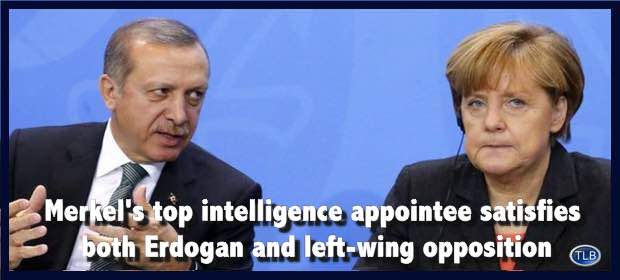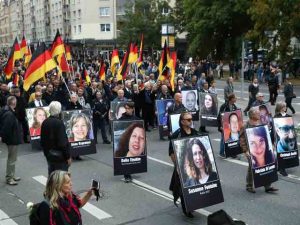
Germany: Turkish-Muslim Appointed Second-In-Command of Domestic Intelligence
- Sinan Selen, a 46-year-old Istanbul-born counter-terrorism expert, will be the first Muslim to fill a top leadership position within Germany’s intelligence community.
- Throughout his government career, Selen has been resolute in confronting Islamic fundamentalists in Germany. He also led efforts at the Federal Office for the Protection of the Constitution (BfV) to monitor the Turkish nationalist Milli Görüs, an influential Islamist movement strongly opposed to Muslim integration into European society.
- The leadership changes at the BfV were spurred by a cellphone video that purportedly showed right-wing mobs attacking migrants over the murder of a German citizen in Chemnitz by two failed asylum seekers. According to the respected blog Tichys Einblick, the video actually documented migrants attacking Germans, not Germans “hunting” migrants.
 Chancellor Angela Merkel has appointed a Turkish immigrant to fill the second-highest position in Germany’s domestic intelligence agency, the Federal Office for the Protection of the Constitution (BfV). Pictured: The building of the BfV in Berlin. (Image source: Wo st 01/Wikimedia Commons) Chancellor Angela Merkel has appointed a Turkish immigrant to fill the second-highest position in Germany’s domestic intelligence agency, the Federal Office for the Protection of the Constitution (BfV). Pictured: The building of the BfV in Berlin. (Image source: Wo st 01/Wikimedia Commons) |
Chancellor Angela Merkel has appointed a Turkish immigrant to fill the second-highest position in Germany’s domestic intelligence agency, the Federal Office for the Protection of the Constitution (Bundesamt für Verfassungsschutz, BfV).
 As the BfV’s new vice president, Sinan Selen (pictured), a 46-year-old Istanbul-born counter-terrorism expert, will be the first Muslim to fill a top leadership position within Germany’s intelligence community.
As the BfV’s new vice president, Sinan Selen (pictured), a 46-year-old Istanbul-born counter-terrorism expert, will be the first Muslim to fill a top leadership position within Germany’s intelligence community.
The appointment comes just weeks after Merkel fired BfV President Hans-Georg Maaßen for publicly defending the anti-mass-migration party Alternative for Germany (AfD) against attacks from Merkel and her junior coalition partner, the center-left Social Democratic Party (SPD).
By choosing Selen, Merkel appears to be trying to achieve several objectives. First, she seems to be attempting to save her floundering government by placating the SPD, which has demanded that the domestic intelligence agency begin monitoring the AfD party, and which has called for more people with a “migration background” in leadership positions at federal agencies.
Selen’s appointment also seems to be a symbolic move aimed at reaching out to Germany’s Turkish community, which has long complained of “institutionalized racism” within the German security apparatus. Finally, by appointing an ethnic Turk, Merkel appears to be trying to mollify Turkish President Recep Tayyip Erdogan, who has repeatedly pressed for her to crack down on anti-Turkish Kurdish elements in Germany.
Selen studied law at the University of Cologne and in 2000 began his career at Germany’s Federal Criminal Police Office (Bundeskriminalamt, BKA), where he was promoted to head of the counterterrorism investigation unit. In 2006, he became deputy head of the cross-border crime unit at the Federal Police (Bundespolizei). In 2011, he was named head of the counter-terrorism unit at the Interior Ministry.
In May 2016, Die Welt reported that Merkel had appointed Selen to lead — apparently at Erdogan’s behest — a special counter-terrorism task force at the German Interior Ministry. The concession was part of the March 2016 EU-Turkey migrant deal, which was designed to halt the flow of migrants from Turkey to Greece. In a lengthy article that examined Erdogan’s growing leverage over Merkel, Die Welt wrote:
“The Federal Government is going so far as to reorganize its internal organizational structure in order to adapt it to Turkish wishes. The Turks have agreed to a ‘new common mechanism’ in the fight against terrorism, with Sinan Selen, of Turkish origin, appointed as the responsible authority at the Federal Interior Ministry….
“Selen is an experienced civil servant who has worked mainly in the field of organized crime; but the fact that such a high-profile position is being created for him has only one explanation: the Turks are to believe that when discussing counter-terrorism with Berlin, they will be speaking with one of their own.”
As leader of the task force, Selen was a key interlocutor with senior Turkish security officials and hashed out a bilateral agreement aimed at improving intelligence cooperation and information sharing. Turkish commentators have posited that Merkel’s appointment of Selen is aimed at sending a message that she wants to continue working with Erdogan’s government in security matters.
Some in the German blogosphere have speculated about Selen’s ideological background. What is known is that throughout his government career, Selen has been resolute in confronting Islamic fundamentalists in Germany. He also led BfV efforts to monitor the Turkish nationalist Milli Görüs (Turkish for “National Vision”), an influential Islamist movement strongly opposed to Muslim integration into European society.
The leadership changes at the BfV were spurred by a cellphone video that purportedly showed right-wing mobs attacking migrants over the murder of a German citizen in Chemnitz by two failed asylum seekers.
 The protests erupted after a 35-year-old German-Cuban man, Daniel Hillig, was stabbed to death by two migrants during the annual festival in Chemnitz on August 26.
The protests erupted after a 35-year-old German-Cuban man, Daniel Hillig, was stabbed to death by two migrants during the annual festival in Chemnitz on August 26.
Police initially refused to reveal the identities of the perpetrators, but on August 27 a police report — since scrubbed from German websites but still remaining on a Russian site — was leaked on social media. The police report showed that the murderers were illegal migrants from Iraq and Syria. Both had extensive criminal histories but were allowed by German authorities to roam free on German streets. Police later confirmed that the leaked document was authentic and said they had opened an investigation into a suspected “violation of official secrets.”
Thousands of people took to the streets for several days (pictured above) to protest both the murder and the government’s inaction on spiraling migrant crime. The protests brought together a broad spectrum of German society, including members of the so-called “far-right scene” as well as counter-protesters.
Near the end of one of the marches, some of the protesters became violent and began insulting migrant passersby. This incident then transformed the narrative in the media from one of the Germans protesting migrant crime to one of far-right attacks on innocent migrants.
Few if any of Germany’s mainstream politicians condemned Hillig’s murder. They were, however, quick to denounce attacks on migrants.
On August 27, Merkel’s spokesman, Steffen Seibert, in a national press conference, condemned the “hunting of humans of a different appearance, of different origins” on the streets of Chemnitz. Chancellor Merkel echoed him:
“We have video footage about the fact that there were hunts, that there were riots, that there was hatred on the street, and that is unacceptable in our constitutional state.”
It later emerged that all of the government’s allegations had been based on a single 19-second video — entitled “Hunting for Humans in Chemnitz” — that had been posted on Facebook by an “anti-fascism” group called Antifa Zeckenbiss and later broadcast by the public television channel ARD.
The video simply shows one individual chasing another in what appears to be an isolated incident. The narrative, however, had already been set in motion.
The chairman of the German Parliament’s Internal Affairs Committee, Burkhard Lischka (SPD), warned of the danger of a civil war:
“There is a small right-wing mob in our country that will take its violent fantasies of civil war to our streets. That in the Bundestag [German parliament] a party applauds these excesses against foreign fellow citizens as legitimate self-justice, shows that the majority of our country must become even louder when it comes to rule of law, democracy and cohesion in our society.”
Bundestag Vice President Thomas Oppermann (SPD) demanded that the BfV domestic intelligence service begin monitoring the anti-mass-migration AfD: “The refugee question divides society and the AfD rides ever more radically on this wave.”
 German Interior Minister Horst Seehofer (CSU – pictured) countered that he saw no basis for monitoring the AfD. On the sidelines of a closed-door meeting of his political party in Brandenburg, Seehofer defended the Chemnitz protesters: “Just because someone protests, that does not make him a Nazi.” Seehofer added: “Migration is the mother of all problems.”
German Interior Minister Horst Seehofer (CSU – pictured) countered that he saw no basis for monitoring the AfD. On the sidelines of a closed-door meeting of his political party in Brandenburg, Seehofer defended the Chemnitz protesters: “Just because someone protests, that does not make him a Nazi.” Seehofer added: “Migration is the mother of all problems.”
Saxon Prime Minister Michael Kretschmer (CDU) later contradicted the government’s claims: “There was no mob, there was no hunting down of people, there was no pogrom in this city.”
Saxon Attorney General Spokesman Wolfgang Klein added: “After examining all of the material available to us, there was no hunt in Chemnitz.”
When asked to rectify his claims, Seibert doubled down:
“I will not have a semantic debate here over a word. Of course, if the Attorney General’s office says so, I will take note. However, it remains that a video shows how people of foreign origin were chased and how they were threatened. It remains true that there were statements that were threatening, close to the call for vigilante justice. So, in my opinion, there is nothing to talk about.”
Like Seibert, Merkel refused to back down:
“We saw pictures that very clearly revealed hate and the persecution of innocent people. One must distance oneself from that. That is all there is to say.”
On September 7, Maaßen cast doubt on the authenticity of the video:
“There is no evidence that the video circulating on the internet for this alleged incident is authentic. According to my cautious assessment, there are good reasons to believe that the video is targeted misinformation, possibly in order to distract the public from the murder in Chemnitz.”
Maaßen’s refusal to support the government’s false narrative unleashed a fury of condemnation from Merkel and her coalition partners in the SPD.
CONTINUE READING HERE
ER recommends other articles by Gatestone Institute
Soeren Kern is a Senior Fellow at the New York-based Gatestone Institute. Follow Soeren Kern on Twitter and Facebook




